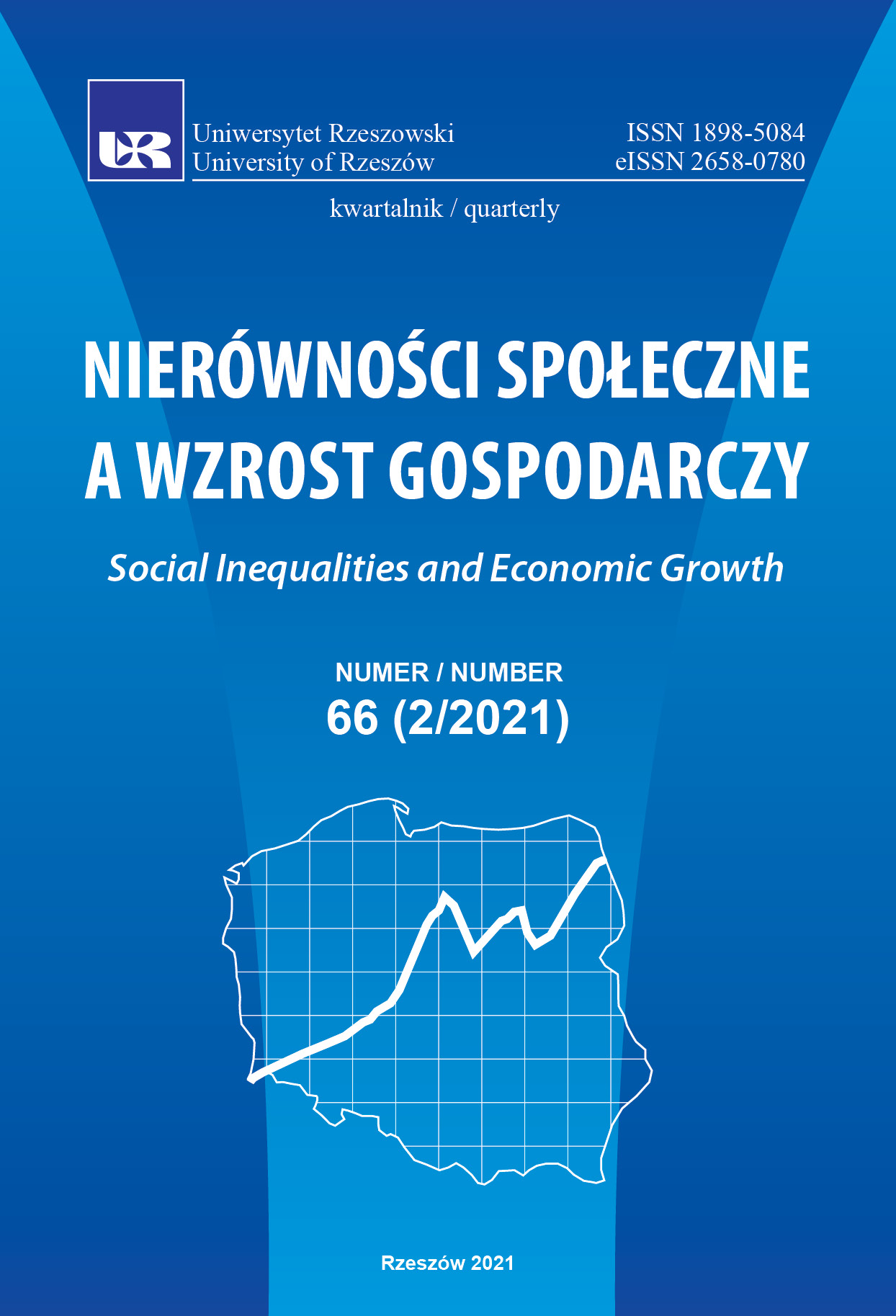Social entrepreneurship in creating the foundations of social security in local communities
DOI:
https://doi.org/10.15584/nsawg.2021.2.9Keywords:
social security, social entrepreneurshipAbstract
Contemporary processes of administration are of a complex character. It requires from policymakers who form the economic policy the choice of adequate and diverse methods and interaction techniques. One needs to be aware of the fact that creating suitable conditions for socio-economic development should take place on different levels of a country’s organisation. Stimulation of development is inscribed into the core and nature of local government actions and supporting social entrepreneurship constitutes one of the biggest challenges on the level of municipalities and counties. The aim of the study is to point to the meaning of social entrepreneurship in creating the foundations of social security. Social entrepreneurship is inseparably connected to one of the contemporary trends in the economy, namely the social economy. In Poland, the social economy has been gaining in popularity in recent years, following a number of negative social effects observed after the rough period of economic transformation and its ownership and structural transitions. In the study, the essence of social entrepreneurship has been characterised as an important action aimed at improving the feeling of social security. The reference has been made to Świętokrzyskie voivodeship, in which the meaning of social entrepreneurship has been pointed and attributed by policymakers responsible for the development policy. The stimulation of social economy subjects may be an important supplement of regional policy aimed at attracting external investments (with shortages of capital connected to the regional policy). This results from the fact that launching business in the social economy sector does not require significant capital outlay, and may constitute a chance for involving young people who want to test themselves in a role of budding entrepreneurs. Promotion of social entrepreneurship might as well contribute to the reinforcement of social cohesion as well as building regional social capital by including into the labour market some groups that are “forgotten” and feel it difficult to find themselves on the open labour market. The article is of an overview character.
Downloads
References
Brzuska, F., Kukulak-Dolata, I., Nyk, M. (2017). (red.). Ekonomia społeczna. Warszawa: Wydawnictwo Difin.
Dees, J. G. (2008). The meaning of social entrepreneurship. Kansas City: Kauffman Center for Entrepreneurial Leadership.
Dolnicki, B. (2003). Samorząd terytorialny. Kraków: Zakamycze.
Durasiewicz, A. (2010). Sieci wsparcia dla radomskich rodzin. W: M. Gagacka, K. Głąbicka (red.), Lokalne sieci wsparcia (s. 35–55). Radom: Wydawnictwo Politechniki Radomskiej.
Human Development Raport (1994). Organizacja Narodów Zjednoczonych.
Gierszewski, J. (2018). Bezpieczeństwo społeczne jako dziedzina bezpieczeństwa narodowego. Historia i Polityka, 23(30), 21–38. DOI: 10.12775/HiP.2018.002.
Gierszewski, J. (2013). Model bezpieczeństwa społecznego na tle teorii systemów. Colloquium, 2, 65–80.
http://www.bazaps.ekonomiaspoleczna.gov.pl/ (2020. 08.25).
Jarmoszko, S., Barszczewski, W. (2017). Bezpieczeństwo społeczne w sytuacjach krytycznych. Siedlce: Wydawnictwo UPH.
Jóźwiak, B. (2012). Zadania samorządu terytorialnego w rozwiązywaniu podstawowych kwestii społecznych. W: A. Skrabacz, S. Sulowski (red.), Bezpieczeństwo społeczne. Pojęcia. Uwarunkowania. Wyzwania (s. 76–98). Warszawa: Wydawnictwo Elipsa.
Kirman, A. (2018). Ekonomia złożoności. W: L. Fischer, J. Hasell, J. Ch. Proctor, D. Uwakwe, Z. W. Perkins, C. Watson (red.), Pomyśleć ekonomię od nowa. Przewodnik po głównych nurtach ekonomii heterodoksyjnej (s. 76–98). Poznań: Wydawnictwo Ekonomiczne Heterodox.
Księżopolski, M. (2001). Bezpieczeństwo socjalne. W: B. Rysz-Kowalczyk (red.), Leksykon polityki społecznej (s. 25–40 ). Warszawa: Wydawnictwo UW.
Kurleto, M. H. (2016). Model przedsiębiorstwa społecznego. Warszawa: Wydawnictwo Difin.
Leszczyński, M. (2011). Bezpieczeństwo społeczne Polaków wobec wyzwań XXI wieku. Warszawa: Wydawnictwo Difin.
Lisiecki, M. (2014). Metody i techniki zarządzania bezpieczeństwem społecznym. W: K. Raczkowski, Ł. Sułkowski (red.), Zarządzanie Bezpieczeństwem. Metody i techniki (s. 165–207). Warszawa: Wydawnictwo Difin.
Mazur, S. (2015). Zarządzanie Publiczne. Warszawa: Wydawnictwo Naukowe Scholar.
Mendel, I. (2008). Przedsiębiorczość społeczna i jej wpływ na rozwój lokalnego kapitału społecznego. Zarys problematyki. Organizacja i Zarządzanie, 4, 93–105.
Praszkier, R., Nowak, A. (2015). Przedsiębiorczość społeczna. Teoria i praktyka. Warszawa: Wydawnictwo Wolters Kluwer.
Regionalny Program Rozwoju Ekonomii Społecznej Województwa Świętokrzyskiego do 2020 roku. (2016). Kielce: Urząd Marszałkowski Województwa Świętokrzyskiego, Regionalny Ośrodek Polityki Społecznej.
Skrabacz, A., Sulowski, S. (red.). (2012). Bezpieczeństwo społeczne. Pojęcia. Uwarunkowania. Wyzwania. Warszawa: Aspra.
Sześciło, D. (2015). Współzarządzanie a usługi publiczne. W: S. Mazur (red.), Współzarządzanie publiczne (s. 286–301). Warszawa: Wydawnictwo Scholar.
Waever, O., Buzan, B., Kelstmp, M., Lemataire, P. (1993). Identity, Migration and the New Security Agenda in Europe. London: Centre for Peace and Conflict Research.
Downloads
Published
How to Cite
Issue
Section
License

This work is licensed under a Creative Commons Attribution-ShareAlike 4.0 International License.


